2013年高考全国I卷英语听力试题(含试题、听力音频、听力原文和答案)
2011年英语听力(全国卷Ⅰ)听力真题+答案

2011年高考英语听力(全国1)试题第一节(共5小题:每小题1.5分,满分7.5分)1. What does the man like about the play?A. The story.B. The ending.C. The actor.2. Which place are the speakers trying to find?A. A hotel.B. A bank.C. A restaurant.3. At what time will the two speakers meet?A. 5:20.B. 5:10.C.4:40.4. What will the man do?A. Change the plan.B. Wait for a phone call.C. Sort things out.5. What does the woman want to do?A. See a film with the man.B. Offer the man some helpC. Listen to some great music.第二节(共15小题;每小题1 5分,满分22 .5分)听下面5段对话。
每段对话后有几个小题,从题中所给出的A、B、C三个选项种选出最佳选项,并标在试卷的相应位置。
听每段对话前,你将有时间阅读各个小题,每小题5秒钟;听完后,各小题给出5秒钟的作答时间。
每段对话读两遍。
听第6段材料,回答6、7题。
6. Where is Ben?A. In the kitchen.B. At school.C. In the park.7. What will the children in the afternoon?A. Help set the table.B. Have a party.C. Do their homework.听第7段材料,回答第8、9题8. What are the two speakers talking about?A. A Family holiday.B. A business trip.C. A travel plan.9. Where did Rachel go?A. Spain.B. Italy.C. China.听第8段材料,回答第10至12题。
全国卷高考英语听力原文试题参考答案
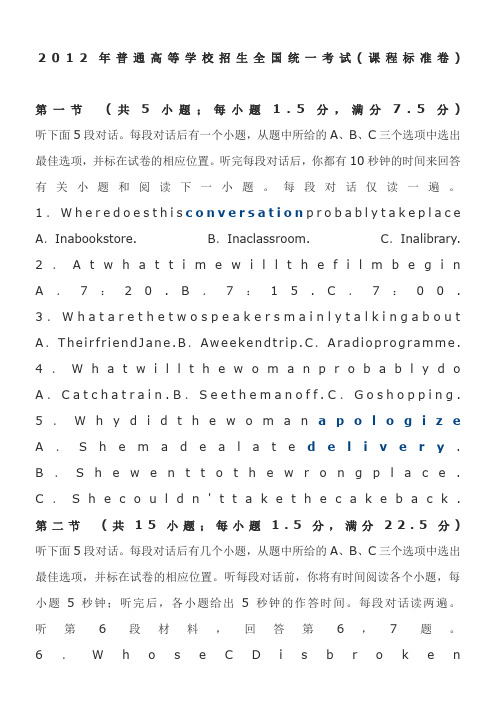
2012年普通高等学校招生全国统一考试(课程标准卷)第一节(共5小题;每小题1.5分,满分7.5分)听下面5段对话。
每段对话后有一个小题,从题中所给的A、B、C三个选项中选出最佳选项,并标在试卷的相应位置。
听完每段对话后,你都有10秒钟的时间来回答有关小题和阅读下一小题。
每段对话仅读一遍。
1.W h e r e d o e s t h i s c o n v e r s a t i o n p r o b a b l y t a k e p l a c e A.Inabookstore.B.Inaclassroom.C.Inalibrary. 2.A t w h a t t i m e w i l l t h e f i l m b e g i n A.7:20.B.7:15.C.7:00. 3.W h a t a r e t h e t w o s p e a k e r s m a i n l y t a l k i n g a b o u t A.T h e i r f r i e n d J a n e.B.Aw e e ke n d t r i p.C.A ra d i o p r o g ra m m e. 4.W h a t w i l l t h e w o m a n p r o b a b l y d o A.C a t c h a t r a i n.B.S e e t h e m a n o f f.C.G o s h o p p i n g. 5.W h y d i d t h e w o m a n a p o l o g i z e A.S h e m a d e a l a t e d e l i v e r y. B.S h e w e n t t o t h e w r o n g p l a c e. C.S h e c o u l d n't t a k e t h e c a k e b a c k.第二节(共15小题;每小题1.5分,满分22.5分)听下面5段对话。
2013全国中学生英语能力竞赛高一组决赛试题含答案

2013年全国中学生英语能力竞赛(NEPCS)决赛高一年级组试题(总分:150分答题时间:120分钟)听力部分(共三大题,记30分)I. Responses (句子应答)(共5小题;每小题1分,记5分)Please listen to the following five sentences and choose the best response to each one you hear. Each sentence will be read only once.(请听句子,然后选出一个能够恰当应答你所听到的句子的最佳选项。
每个句子只读一遍。
)1.A. It’S sunny.B.What a pity.C.I think so.D.You’d better not.2.A.I think it’s a western.B.I don’t want to watch that.C.The news is at six fifteen.D.I'll meet you at the school gate.3.A.I’11 have dinner with you.B.Give me a call at any time.C.It depends on how busy we are.D.Let’S go to see a film.4.A.Never mind.B.You’re welcome.C.I've no idea.D.That’S wonderful.5.A.Will 2 o'clock this afternoon be OK? B.That’S really amazing.C.I’ll try my best.D.I like Chinese food best.II. Dialogues(对话理解)(共15小题;每小题1分,记15分)A) Please listen to the following five mini-dialogues. Each dialogue is followed by a question. Choose the best answer or picture for each question. Each dialogue and question will be read twice.(请听下面五组对话,每组对话后有一个问题,根据你所听到的对话内容,选择能回答所提问的最佳选项。
2007年高考全国卷英语听力试题(含试题、听力音频、听力原文和答案)
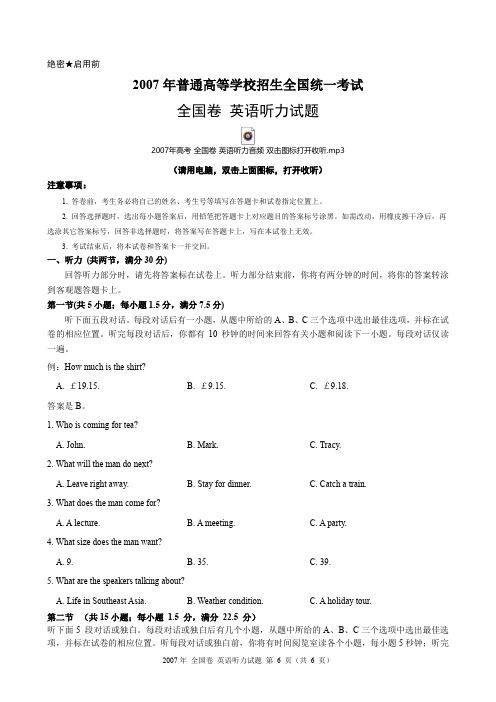
绝密★启用前2007年普通高等学校招生全国统一考试全国卷英语听力试题2007年高考 全国卷 英语听力音频 双击图标打开收听.mp3(请用电脑,双击上面图标,打开收听)注意事项:1. 答卷前,考生务必将自己的姓名、考生号等填写在答题卡和试卷指定位置上。
2. 回答选择题时,选出每小题答案后,用铅笔把答题卡上对应题目的答案标号涂黑。
如需改动,用橡皮擦干净后,再选涂其它答案标号,回答非选择题时,将答案写在答题卡上,写在本试卷上无效。
3. 考试结束后,将本试卷和答案卡一并交回。
一、听力(共两节,满分30分)回答听力部分时,请先将答案标在试卷上。
听力部分结束前,你将有两分钟的时间,将你的答案转涂到客观题答题卡上。
第一节(共5小题;每小题1.5分,满分7.5分)听下面五段对话。
每段对话后有一小题,从题中所给的A、B、C三个选项中选出最佳选项,并标在试卷的相应位置。
听完每段对话后,你都有10秒钟的时间来回答有关小题和阅读下一小题。
每段对话仅读一遍。
例:How much is the shirt?A. £19.15.B. £9.15.C. £9.18.答案是B。
1. Who is coming for tea?A. John.B. Mark.C. Tracy.2. What will the man do next?A. Leave right away.B. Stay for dinner.C. Catch a train.3. What does the man come for?A. A lecture.B. A meeting.C. A party.4. What size does the man want?A. 9.B. 35.C. 39.5. What are the speakers talking about?A. Life in Southeast Asia.B. Weather condition.C. A holiday tour.第二节(共15小题;每小题 1.5 分,满分22.5 分)听下面5 段对话或独白。
2004年高考全国卷英语听力试题(含试题、听力音频、听力原文和答案)
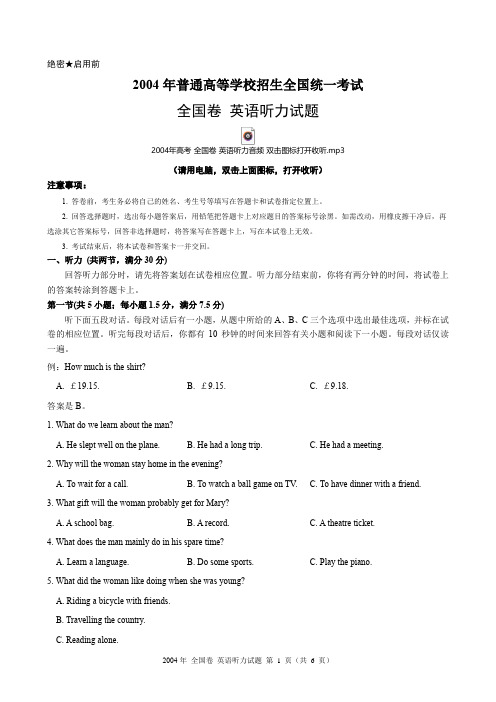
绝密★启用前2004年普通高等学校招生全国统一考试全国卷英语听力试题2004年高考 全国卷 英语听力音频 双击图标打开收听.mp3(请用电脑,双击上面图标,打开收听)注意事项:1. 答卷前,考生务必将自己的姓名、考生号等填写在答题卡和试卷指定位置上。
2. 回答选择题时,选出每小题答案后,用铅笔把答题卡上对应题目的答案标号涂黑。
如需改动,用橡皮擦干净后,再选涂其它答案标号,回答非选择题时,将答案写在答题卡上,写在本试卷上无效。
3. 考试结束后,将本试卷和答案卡一并交回。
一、听力(共两节,满分30分)回答听力部分时,请先将答案划在试卷相应位置。
听力部分结束前,你将有两分钟的时间,将试卷上的答案转涂到答题卡上。
第一节(共5小题;每小题1.5分,满分7.5分)听下面五段对话。
每段对话后有一小题,从题中所给的A、B、C三个选项中选出最佳选项,并标在试卷的相应位置。
听完每段对话后,你都有10秒钟的时间来回答有关小题和阅读下一小题。
每段对话仅读一遍。
例:How much is the shirt?A. £19.15.B. £9.15.C. £9.18.答案是B。
1. What do we learn about the man?A. He slept well on the plane.B. He had a long trip.C. He had a meeting.2. Why will the woman stay home in the evening?A. To wait for a call.B. To watch a ball game on TV.C. To have dinner with a friend.3. What gift will the woman probably get for Mary?A. A school bag.B. A record.C. A theatre ticket.4. What does the man mainly do in his spare time?A. Learn a language.B. Do some sports.C. Play the piano.5. What did the woman like doing when she was young?A. Riding a bicycle with friends.B. Travelling the country.C. Reading alone.第二节(共15小题;每小题1.5分,满分22.5分)听下面5段对话或独白。
2020年高考全国Ⅰ卷英语试题听力部分(含听力音频、听力原文和答案)
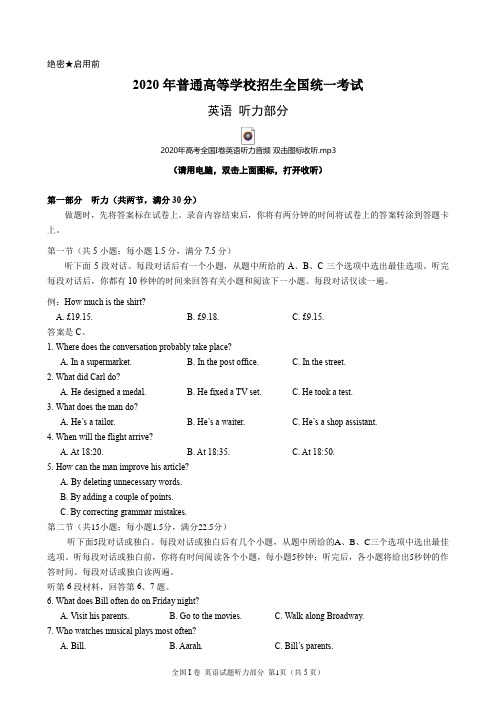
绝密★启用前2020年普通高等学校招生全国统一考试英语听力部分2020年高考全国I卷英语听力音频 双击图标收听.mp3(请用电脑,双击上面图标,打开收听)第一部分听力(共两节,满分30分)做题时,先将答案标在试卷上。
录音内容结束后,你将有两分钟的时间将试卷上的答案转涂到答题卡上。
第一节(共5小题;每小题1.5分,满分7.5分)听下面5段对话。
每段对话后有一个小题,从题中所给的A、B、C三个选项中选出最佳选项。
听完每段对话后,你都有10秒钟的时间来回答有关小题和阅读下一小题。
每段对话仅读一遍。
例:How much is the shirt?A. £19.15.B. £9.18.C. £9.15.答案是C。
1. Where does the conversation probably take place?A. In a supermarket.B. In the post office.C. In the street.2. What did Carl do?A. He designed a medal.B. He fixed a TV set.C. He took a test.3. What does the man do?A. He’s a tailor.B. He’s a waiter.C. He’s a shop assistant.4. When will the flight arrive?A. At 18:20.B. At 18:35.C. At 18:50.5. How can the man improve his article?A. By deleting unnecessary words.B. By adding a couple of points.C. By correcting grammar mistakes.第二节(共15小题;每小题1.5分,满分22.5分)听下面5段对话或独白。
2001年高考全国卷英语听力试题(含试题、听力音频、听力原文和答案)

绝密★启用前2001年普通高等学校招生全国统一考试全国卷英语听力试题2001年高考 全国卷 英语听力音频 双击图标打开收听.mp3(请用电脑,双击上面图标,打开收听)注意事项:1. 答卷前,考生务必将自己的姓名、考生号等填写在答题卡和试卷指定位置上。
2. 回答选择题时,选出每小题答案后,用铅笔把答题卡上对应题目的答案标号涂黑。
如需改动,用橡皮擦干净后,再选涂其它答案标号,回答非选择题时,将答案写在答题卡上,写在本试卷上无效。
3. 考试结束后,将本试卷和答案卡一并交回。
第一部分听力(共两节,满分30分)做题时,先将答案标在试卷上。
录音内容结束后,你将有两分钟的时间将试卷上的答案转涂到答题卡上。
第一节(共5小题;每小题1.5分,满分7.5分)听下面5段对话。
每段对话后有一个小题,从题中所给的A、B、C三个选项中选出最佳选项。
听完每段对话后,你都有10秒钟的时间来回答有关小题和阅读下一小题。
每段对话仅读一遍。
例:How much is the shirt?A. £19.15.B. £9.18.C. £9.15.答案是C。
1.Where did this conversation most probably take place?A.At a concert.B.At a flower shop.C.At a restaurant.2.What did Paul do this morning?A.He had a history lesson.B.He had a chemistry lesson.C.He attended a meeting.3.What can we learn about the man from the conversation?A.He's anxious to see his sister.B.He wrote to his sister last month.C.He's expecting a letter from his sister.4.At what time does the train leave?A.3:00.B.3:15.C.5:00.5.What is the man’s problem?A.He can’t decide how to go.B.He can’t drive himself.C.He doesn’t like travelling by train.第二节(共15小题;每小题1分,满分15分)听下面5段对话或独白。
视听说,U校园英语听力原文

视听说,U校园英语听力原文Section A News reports(10分,3篇新闻,10道判断对错题目)Unit 1 News 1The authorities in Los Angeles have defended their decision to close all public schools for the day because of a suspected security threat. A similar threat was received in New York where the authority said it was not credible. Officials from New York also pointed out that the closure of public schools in Los Angeles is a significant overreaction. Los Angeles defended that they have decided to close down the entire public school system out of what they called an abundance of caution after they've received a threat in an email. The authority said that they would search every school in the district to make sure they were safe for pupils to return. As that got underway, New York City officials reviewed they had received the same threat, but quickly dismissed it. A member of the House Select Committee on intelligence has since said the threat is believed to be an active mischief.Q1: Who was responsible for the closure of the entire public school system? Q2: What is the direct cause for this abundance of caution?洛杉矶当局为他们当天关闭所有公立学校的决定辩护,因为有人怀疑安全威胁。
2013年全国高考英语听力试题、原文及答案

2013年普通高等学校招生全国统一考试英语分)听力(每题1.5分,满分30分)第一节第一节1. What does the man want to do? A. Take photos. B. Buy a camera. C. Help the woman. 2. What are the speakers talking about? B. Their life in town. C. A place of living. C. A place of living. A. A noisy night. B. Their life in town. 3. Where is the man now? A. On his way. B. In a restaurant. C. At home 4. What will Celia do? A. Find a player. B. Watch a game. C. Play basketball. 5. What day is it when the conversation takes place? A. Saturday. B. Sunday. C. Monday. 第二节第二节题。
听第6段材料,回答6、7题。
6. What is Sara going to do? A. Buy John a gift. B. Give John a surprise. C. Invite John to France. ’s plan? 7. What does the man think of SaraA. Funny. B. Exciting. C. Strange. 题。
听第7段材料,回答第8、9题。
8. Why does Diana say sorry to peter? A. She has to give up her travel pan. B. She wants to visit another city. C. She needs to put off her test. 9. What does Diana want Peter to do? A. Help her with her study. B. Take a book to her friend. C.T eacha geography lesson. 听第8段材料,回答第10至12题。
2000年高考全国卷英语听力试题(含试题、听力音频、听力原文和答案)

绝密★启用前2000年普通高等学校招生全国统一考试全国卷英语听力试题2000年高考 全国卷 英语听力音频 双击图标打开收听.mp3(请用电脑,双击上面图标,打开收听)注意事项:1. 答卷前,考生务必将自己的姓名、考生号等填写在答题卡和试卷指定位置上。
2. 回答选择题时,选出每小题答案后,用铅笔把答题卡上对应题目的答案标号涂黑。
如需改动,用橡皮擦干净后,再选涂其它答案标号,回答非选择题时,将答案写在答题卡上,写在本试卷上无效。
3. 考试结束后,将本试卷和答案卡一并交回。
第一部分听力(共两节,满分30分)做题时,先将答案标在试卷上。
录音内容结束后,你将有两分钟的时间将试卷上的答案转涂到答题卡上。
第一节(共5小题;每小题1.5分,满分7.5分)听下面5段对话。
每段对话后有一个小题,从题中所给的A、B、C三个选项中选出最佳选项。
听完每段对话后,你都有10秒钟的时间来回答有关小题和阅读下一小题。
每段对话仅读一遍。
例:How much is the shirt?A. £19.15.B. £9.18.C. £9.15.答案是C。
1.Where are the two speakers?A.In a department store.B.In a clothes factory.C.On a playground.2.What time does the train leave?A.At6:15.B.At6:25.C.At6:50.3.What are the two speakers doing?A.Enjoying meeting each other.B.Saying goodbye to each other.C.Planning to see each other again.4.What’s the man doing?A.He’s working in a hotel.B.He’s visiting a young couple.C.He’s traveling around.5.When should Susan go to meet Professor Brown?A.At10:00.B.At10:30.C.At11:00.第二节(共15小题;每小题1.5分,满分22.5分)听下面5段对话或独白。
高考英语听力真题,历年英语听力原文打印版
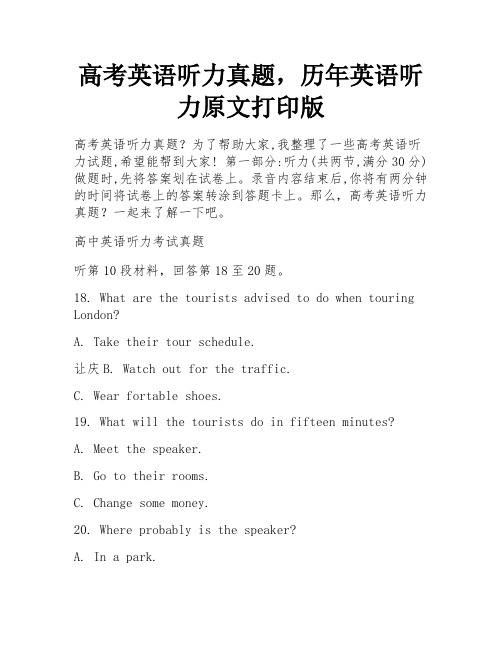
高考英语听力真题,历年英语听力原文打印版高考英语听力真题?为了帮助大家,我整理了一些高考英语听力试题,希望能帮到大家! 第一部分:听力(共两节,满分30分) 做题时,先将答案划在试卷上。
录音内容结束后,你将有两分钟的时间将试卷上的答案转涂到答题卡上。
那么,高考英语听力真题?一起来了解一下吧。
高中英语听力考试真题听第10段材料,回答第18至20题。
18. What are the tourists advised to do when touring London?A. Take their tour schedule.让庆B. Watch out for the traffic.C. Wear fortable shoes.19. What will the tourists do in fifteen minutes?A. Meet the speaker.B. Go to their rooms.C. Change some money.20. Where probably is the speaker?A. In a park.B. In a hotel.判滑旦C. In a shopping centre.听力参考答案1-20 BCACB ACABC BACAC BACAB听力原文Text 1M: Lucy, would you like to have lunch with me tomorrow?W: Oh, I’d really love to, but I have an appointment with my dentist at 11:30. Thanks for inviting me.Text 2W: Peter, how is the weather now? Is it still raining?M: No, but there’s still lots of clouds. The weatherman said the sun wouldn’t e out until next week.Text 3M: I’m sorry I was late for class today, Dr. Simpson.W: Well, I’ll let it go this time. But you saw it disturbed the rest of the class.M: Yes, I realized that. I won’t let it happen again. Text 4W: Hi, Mike. Listen, I’m ing back this afternoon, and I’ll take a bus from the railway station. So, you don’t need to e and pick me up.M: OK, take care, and see you soon.Text 5M: Jenny, there’s an opening for an assistant manager in our pany. You should give it a try.W: Thank you George, but I’ve decided to travel a bit before finding another job.Text 6M: By the way, do you know what time it is?W: Well, it’s a quarte r to two.掘扰M: Oh, I’ve got to go.W: See Linda in the library?M: No. Actually I’m going to meet with Professor Smith at ten past two. You may continue our project discussion with Michael.W: All right.Text 7W: Harry, guess what? I’ve just received an e mail from Pamela. She and Peter are ing down to see us this weekend.M: Oh, that’s good news! We haven’t seen them for ages.W: Yeah. The last time we met them was at our wedding three years ago.M: Did Pamela mention how long they’ll stay?W: About one week.M: Great! I can’t wait to show them around our new house.W: Me too. We haven’t had any guests since we movedin here. If the weather is fine, we can have a barbecue in the garden.M: Good idea. I’ll go to the market tomorrow to buy all the things we’l l need.Text 8W: Hello, everyone. Wele to our program. Today, we are fortunate to have a special guest with us. Some of you may have heard of him before. He’s an artist. His works have received many prizes and have been shown in over one hundred exhibitions across the country — Los Angeles, New York, Philadelphia, to name just a few. His name is Chris Cucksy. So Chris, tell us a bit about yourself.M: Well, I was born in Springfield, Missouri, and grew up in Kansas. I didn’t e from a family with wealth or position, but I did manage to get a master’s degreein fine arts.W: When did you first start to make art? And what was the turning point in your life that made you an artist?M: I always liked drawing as early as I can remember, so right from then, I knew what I was going to be: an artist.W: What is it that always inspires you to create?M: Nature is the biggest inspiration. I’m always inspired by things of beauty and harmony.Text 9M: You must be pretty excited about your trip to Europe, Dorothy. When are you leaving?W: In just two weeks, and I am excited. I’ve been looking forward to this training program for a long time. But there are still a few things I need to do before I go.M: Like what?W: Like renewing my passport and figuring out what to do wi th my apartment while I’m gone.M: You are not going to give it up, are you?W: No way! I’ll never find another apartment like it around here. But I don’t like the idea of paying three months for an empty apartment, either. So, I’m looking for someone to t ake it while I’m away.M: Um, let me think. Oh, I know just a person. An old colleague of mine, Jim Thomas. He is ing here to do some research this summer, from June to August.W: Well, that’s exactly when I’ll be away!M: Tell you what: I’ll be calling Jim late this week anyway, so I’ll mention it to him.W: Well, thanks, Bill.Text 10W: I hope I’ve given you a clear idea of the schedule for your London weekend. And, before I finish, let me just give you some advice which should make your stay more enjoyable. Firstly, please do remember to put on some fortable shoes. London is a big place, and whatever you do, you’ll find yourself doing quite a lot of walking. So, fortable shoes are really necessary. And secondly, let me ask you to please look after your money. Keep it safe at all times, and then you will not have any unpleasant accident, which could ruin your whole weekend. You’ll find a copy of your weekend’s schedule in your room. Take a look at it, and make sure you’re clear about everything. Well,th at’s all from me for now. Go and leave your luggage in your rooms. I’ll be seeing you here again in fifteen minutes. Goodbye for now!高中英语听力训练真题及音频高考全国一卷英语试卷结构一、全国英语卷I英语试卷由四部分组成,试卷总分150分第一部分听力(30分,计入总分);第二部分阅读理解(包含阅读和七选五,40分);第三部分语言知识运用(包含完形填空和语法填空,45分);第四部分写作(包含短文改错和书面表达,35分);二、第一部分听力试题【命题意图】听力选材多是学生熟悉的日常交际场景,基本没有生僻词语,语速适中,侧重考查考生在规定时间内对听到的语料的反应能力和理解能力。
2017年高考全国I卷英语听力(含听力音频、听力原文和答案)
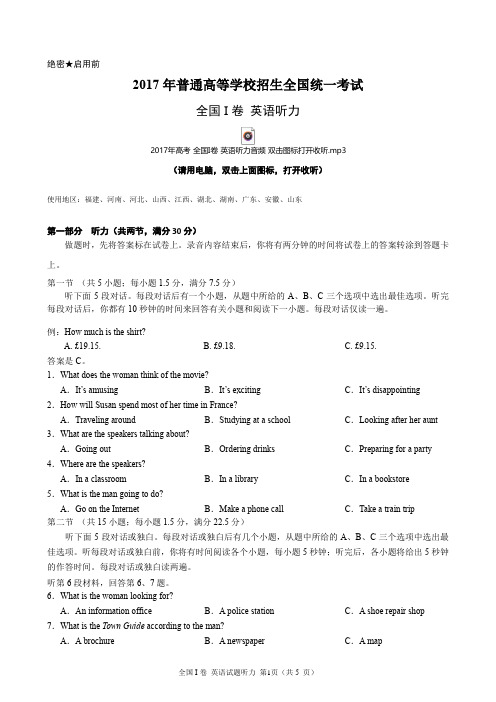
绝密★启用前2017年普通高等学校招生全国统一考试全国I卷英语听力2017年高考 全国I卷 英语听力音频 双击图标打开收听.mp3(请用电脑,双击上面图标,打开收听)使用地区:福建、河南、河北、山西、江西、湖北、湖南、广东、安徽、山东第一部分听力(共两节,满分30分)做题时,先将答案标在试卷上。
录音内容结束后,你将有两分钟的时间将试卷上的答案转涂到答题卡上。
第一节(共5小题;每小题1.5分,满分7.5分)听下面5段对话。
每段对话后有一个小题,从题中所给的A、B、C三个选项中选出最佳选项。
听完每段对话后,你都有10秒钟的时间来回答有关小题和阅读下一小题。
每段对话仅读一遍。
例:How much is the shirt?A. £19.15.B. £9.18.C. £9.15.答案是C。
1.What does the woman think of the movie?A.It’s amusing B.It’s exciting C.It’s disappointing 2.How will Susan spend most of her time in France?A.Traveling around B.Studying at a school C.Looking after her aunt 3.What are the speakers talking about?A.Going out B.Ordering drinks C.Preparing for a party 4.Where are the speakers?A.In a classroom B.In a library C.In a bookstore 5.What is the man going to do?A.Go on the Internet B.Make a phone call C.Take a train trip第二节(共15小题;每小题1.5分,满分22.5分)听下面5段对话或独白。
2013年高考英语试卷听力+原文+答案(新课标Ⅰ、Ⅱ)

2013年全国统一高考英语试卷(新课标I)听力试题第一部分听力(共两节,满分30分)做题时,先将答案标在试卷上,录音结束后,你将有两分钟的时间将试卷上的答案转涂到答题卡上。
第一节(共5小题,每小题1.5分,满分7.5分)听下面5段对话。
每段对话后有一个小题,从题中所给的A、B、C三个选项中选出最佳答案。
听完每段对话后,你都有10秒钟的时间来回答有关小题和阅读下一小题。
每段对话仅读一遍。
例: How much is the shirt?A. £ 19.15.B. £9.18.C. £9.15.答案是C.1. What does the man want to do?A. Take photos.B. Buy a camera.C. Help the woman.2. What are the speakers talking about?A. A noisy night.B. Their life in town.C. A place of living.3. Where is the man now?A. On his way.B. In a restaurant.C. At home4. What will Celia do?A. Find a player.B. Watch a game.C. Play basketball.5. What day is it when the conversation takes place?A. Saturday.B. Sunday.C. Monday.第二节(共15小题:每小题1.5分,满分22.5分)听下面5段对话或独白。
每段对话或独白后有几个小题,从题中所给的A、B、C三个选项中选出最佳选项,并标在试卷的相应位置。
听每段对话或独白前,你将有时间阅读各个小题,每小题5秒钟;听完后,个小题将给出5秒钟的作答时间。
每段对话或独白读两遍。
(完整版)年高考真题英语听力真题及听力原文附答案(全国卷)
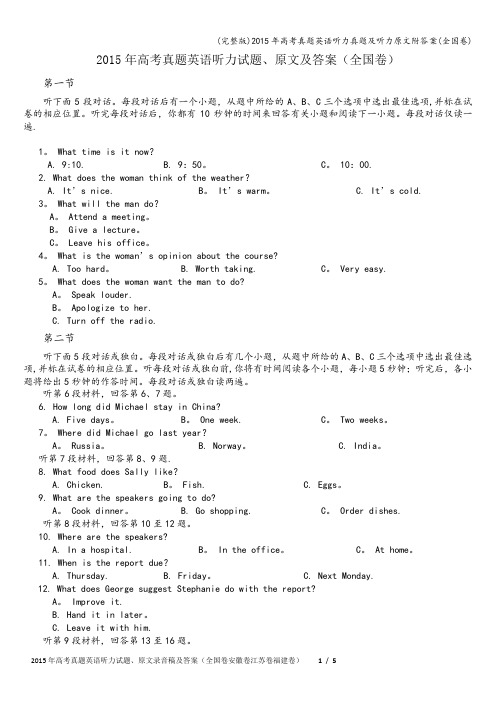
2015年高考真题英语听力试题、原文及答案(全国卷)第一节听下面5段对话。
每段对话后有一个小题,从题中所给的A、B、C三个选项中选出最佳选项,并标在试卷的相应位置。
听完每段对话后,你都有10秒钟的时间来回答有关小题和阅读下一小题。
每段对话仅读一遍.1。
What time is it now?A. 9:10.B. 9:50。
C。
10:00.2. What does the woman think of the weather?A. It’s nice. B。
It’s warm。
C. It’s cold.3。
What will the man do?A。
Attend a meeting。
B。
Give a lecture。
C。
Leave his office。
4。
What is the woman’s opinion about the course?A. Too hard。
B. Worth taking. C。
Very easy.5。
What does the woman want the man to do?A。
Speak louder.B。
Apologize to her.C. Turn off the radio.第二节听下面5段对话或独白。
每段对话或独白后有几个小题,从题中所给的A、B、C三个选项中选出最佳选项,并标在试卷的相应位置。
听每段对话或独白前,你将有时间阅读各个小题,每小题5秒钟;听完后,各小题将给出5秒钟的作答时间。
每段对话或独白读两遍。
听第6段材料,回答第6、7题。
6. How long did Michael stay in China?A. Five days。
B。
One week. C。
Two weeks。
7。
Where did Michael go last year?A。
Russia。
B. Norway。
C. India。
听第7段材料,回答第8、9题.8. What food does Sally like?A. Chicken. B。
2016-2018三年 高考英语全国I卷听力原文 参考答案 与解析(原创)

2016-2018三年高考英语全国I卷听力原文参考答案与解析2018年英语试题听力原文及参考答案参考答案BCCBA BABCC ABAAC BCBCA第一部分听力(共两节,满分30分)做题时,先将答案标在试卷上。
录音内容结束后,你将有两分钟的时间将试卷上的答案转涂到答题卡上。
第一节(共5小题;每小题1.5分,满分7.5分)听下面5段对话。
每段对话后有一个小题,从题中所给的A、B、C三个选项中选出最佳选项。
听完每段对话后,你都有10秒钟的时间来回答有关小题和阅读下一小题。
每段对话仅读一遍。
例:How much is the shirt?A.£19.15.B.£9.18.C.£9.15.答案是C。
1.what will James do tomorrow?A.Watch a TV program.B.Give a talk.C.Write a report.2.What can we say about the woman?A.She's generous.B.She's curious.C.She's helpful.3.When does the train leave?A.At6:30.B.At8:30.C.At10:30.4.How does the woman go to work?A.By car.B.On foot.C.By bike5.What is the probable relationship between the speakers?A.Classmates.B.Teacher and student.C.Doctor and patient.第二节(共15小题;每小题1.5分,满分22.5分)听下面5段对话或独白。
每段对话或独白后有几个小题,从题中所给的A、B、C三个选项中选出最佳选项。
听每段对话或独白前,你将有时间阅读各个小题,每小题5秒钟;听完后,各小题将给出5秒钟的作答时间。
2011年高考全国卷英语听力试题(含试题、听力音频、听力原文和答案)
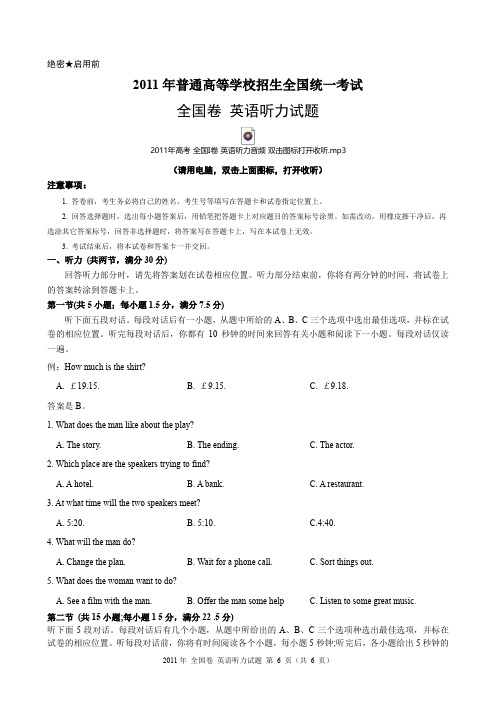
绝密★启用前2011年普通高等学校招生全国统一考试全国卷英语听力试题2011年高考 全国I卷 英语听力音频 双击图标打开收听.mp3(请用电脑,双击上面图标,打开收听)注意事项:1. 答卷前,考生务必将自己的姓名、考生号等填写在答题卡和试卷指定位置上。
2. 回答选择题时,选出每小题答案后,用铅笔把答题卡上对应题目的答案标号涂黑。
如需改动,用橡皮擦干净后,再选涂其它答案标号,回答非选择题时,将答案写在答题卡上,写在本试卷上无效。
3. 考试结束后,将本试卷和答案卡一并交回。
一、听力(共两节,满分30分)回答听力部分时,请先将答案划在试卷相应位置。
听力部分结束前,你将有两分钟的时间,将试卷上的答案转涂到答题卡上。
第一节(共5小题;每小题1.5分,满分7.5分)听下面五段对话。
每段对话后有一小题,从题中所给的A、B、C三个选项中选出最佳选项,并标在试卷的相应位置。
听完每段对话后,你都有10秒钟的时间来回答有关小题和阅读下一小题。
每段对话仅读一遍。
例:How much is the shirt?A. £19.15.B. £9.15.C. £9.18.答案是B。
1. What does the man like about the play?A. The story.B. The ending.C. The actor.2. Which place are the speakers trying to find?A. A hotel.B. A bank.C. A restaurant.3. At what time will the two speakers meet?A. 5:20.B. 5:10.C.4:40.4. What will the man do?A. Change the plan.B. Wait for a phone call.C. Sort things out.5. What does the woman want to do?A. See a film with the man.B. Offer the man some helpC. Listen to some great music.第二节(共15小题;每小题1 5分,满分22 .5分)听下面5段对话。
《现代大学英语听力2》听力原文及题目答案Unit3
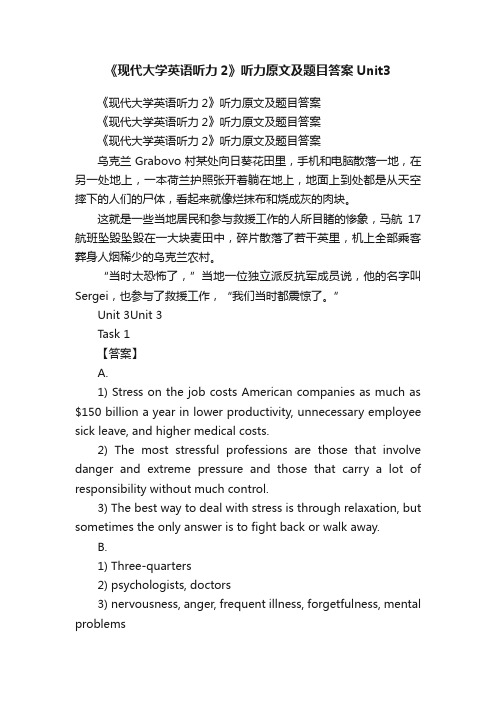
《现代大学英语听力2》听力原文及题目答案Unit3《现代大学英语听力2》听力原文及题目答案《现代大学英语听力2》听力原文及题目答案《现代大学英语听力2》听力原文及题目答案乌克兰Grabovo村某处向日葵花田里,手机和电脑散落一地,在另一处地上,一本荷兰护照张开着躺在地上,地面上到处都是从天空摔下的人们的尸体,看起来就像烂抹布和烧成灰的肉块。
这就是一些当地居民和参与救援工作的人所目睹的惨象,马航17航班坠毁坠毁在一大块麦田中,碎片散落了若干英里,机上全部乘客葬身人烟稀少的乌克兰农村。
“当时太恐怖了,”当地一位独立派反抗军成员说,他的名字叫Sergei,也参与了救援工作,“我们当时都震惊了。
”Unit 3Unit 3Task 1【答案】A.1) Stress on the job costs American companies as much as $150 billion a year in lower productivity, unnecessary employee sick leave, and higher medical costs.2) The most stressful professions are those that involve danger and extreme pressure and those that carry a lot of responsibility without much control.3) The best way to deal with stress is through relaxation, but sometimes the only answer is to fight back or walk away.B.1) Three-quarters2) psychologists, doctors3) nervousness, anger, frequent illness, forgetfulness, mental problems【原文】Stress on the job costs American companies as much as $150 billion a year in lower productivity, unnecessary employee sick leave, and higher medical costs. Three-quarters of the office workers today say they suffer from stress at work. Recently, psychologists and doctors have begun to study the problem more closely. They have discovered that the most stressful professions are those that involve danger, extreme pressure and those that carry a lot of responsibility without much control.The sign of stress range from nervousness, anger, and frequent illness to forgetfulness or even mental problems. The best way to deal with stress is through relaxation, but sometimes the only answer is to fight back or walk away.Task 2【答案】A.1)give in so easily to hijackers’ demandsa) threaten to blow up a plane, commit some other outageb) hold out against this kind of blackmail, always have terrorists, Start executing terroristsautomaticallyc)be prepared to face the consequences of evil2)a) It’s the lesser of two evils. Terrorists have proven often enough that they really mean business.b)Innocent lives, threatening the innocent will achieve its ends.B.She implies that if the first speaker was one of the victims of terrorism, she would want the government to give in to thedemands so that she wouldn’t die.【原文】Margaret: Governments give in so easily to hijackers’ demands. A hijacker only has to threaten to blow up a plane or commit some other outrage, and a government gives in to his demands.Valerie: Naturally. It’s the less er of the two evils. What government would risk innocent lives just to see if terrorists will really do what they threaten to do? Terrorists have proven often enough that they really mean business.Margaret: Yes, but i f a government doesn’t hold out against this kind of blackmail, we wil l always have terrorists. Governments are afraid to punish these people. They almost always letthem go free. Start executing terrorists automatically wherever they land, and terrorismwill stop.Valerie: And what about the innocent lives that will be lost in the process? Terrorism is based on the simple idea that threatening the innocent will achieve its ends.Margaret: You can’t get rid of evil without being prepared to face the consequences of evil. Valerie: So long as you’re not one of the victims!Task 3【答案】A.1)thirty-five, natural light, a small window, hot, airless, very noisy2) Mexico3) ought to, shouldn’tB.1)It is located in a narrow street with five-and six-storey buildings eight kilometers fromdowntown Los Angeles.2) This factory makes shirts and jeans3) She’s already been working for ten hours, but won’t stop for another two hours.4) She can’t complain about those things because she is an illegal immigrant.【原文】Eight kilometers from downtown Los Angeles there is a narrow street with five- and six-storey buildings. Inside one of these buildings there is a small factory making shirts and jeans. The women working in the factory sit close together, each with a small table, each with their own sewing machine. The women say nothing, and work hard. In one of the rooms there are thirty-five women. There is only a little natural light, and this comes from a small window in the roof. The room is hot, airless, and very noisy. On the left-hand side of the room there is a young girl sitting next to the wall. Every now and again she closes her eyes, and her fingers stop working. She's already been in her chair for ten hours, but she'll be here until the bell rings — and that won't be for another two hours. Her name is Maria, and she comes from Mexico. She won't complain about her work. She won't say that the working hours ought to be changed; she won't say that the working conditions shouldn't be permitted.Task 4【答案】A.Every year the British government publishes statistics aboutsocial trends. Their findings show definite patterns in the British way of life.1)marked differencesa)one hour more every day, three hours more every weekb) 1 percent, cleaning and ironing, keep household accounts, do repairs or improvementsc)30 percent2)leisure activities, watching television, 20 hours a week, going for walks, Swimming, BritishwomenB.Unlike the other couples, Carla has always kept her won accounts and Adrian has always done his own housework. Neither of them like watching television very much and they both like swimming.【原文】When Adrian Hutton and Carla Leone get married they will move into a new house that they have bought. But what sort of life will they have? What can they expect in modern Britain? Every year the British government publishes statistics about social trends. Their findings show definite patterns in the British way of life.In most marriages there are some marked differences between husbands and wives. Working wives, for example, sleep (on average) one hour more a day than working husbands. Housewives, on the other hand, sleep only about three hours more every week than their working husbands. And what about housework? The government survey showed that only 1% of men do the household chores — like cleaning and ironing. But they do usually keep household accounts and it is always men who dorepairs or improvements in the house. 30% of all marriages end in divorce.The government survey also looked at leisure activities. They found that the two most popular leisure activities in Britain are watching television (the average family spends 20 hours a week in front of the TV set) and going for walks. Swimming is an especially popular activity among British women.Carla and Adrian's life, though, will probably be different from the average marriage. In the first place Carla has always kept her own accounts and Adrian has always done his own housework. Neither of them like watching television very much and they both like swimming.Task 5【答案】A.Topic: How a city in Japan solve the problem of garbage disposal.Supporting details: 160 million, every year, 10 percent, 10 percent, the rest, public cooperation1) garbage that can be easily burned, kitchen and garden trash2) electrical appliances, plastic tools, plastic toys3) are poisonous, cause pollution, batteries4) bottles and glass containers that can be recycled5) metal containers that can be recycled6) furniture and bicycledon different days, on request, fertilizer, to produce electricity, recycled, cleaned, repaired, resold cheaply, give awayB.1) The garbage will be taken to a center that looks like a cleannew office building or hospital.Inside the center, special equipment is used to sort and process the garbage.2) Official from cities around the world visit Machida to see whether they can use some of these ideas and techniques to solve their own garbage disposal problems.【原文】Disposing of the garbage we produce every day is a major problem in cities around the world. In the United States, over 160 million tons of garbage are produce every year. Ten percent is recycled, ten percent is burned, and the rest is put in landfills. But finding land for new landfills is becoming more difficult.A city that has solved this problem in an unusual way is Machida, in Tokyo, Japan. They have developed a totally new approach to garbage disposal. The key to the operation is public cooperation. Families must divide their garbage into six categories:1. garbage that can be easily burned (that is, combustible garbage) such as kitchen and garden trash?;2. noncombustible garbage, such as small electrical appliances, plastic tools, and plastic toys?;3. products that are poisonous or that cause pollution, such as batteries and fluorescent lights?;4. bottles and glass containers that can be recycled?;5. metal containers that can be recycled?;6. large items, such as furniture and bicycles.The items in categories1 to 5 are collected on different days. Large items are only collected upon request. Then the garbage is taken to a center that looks like a clean new office building or hospital. Inside the center, special equipment is used to sort andprocess the garbage. Almost everything can be reused: garden or kitchen trash becomes fertilizer; combustible garbage is burned to produce electrical; metal containers and bottles are recycled; and old furniture, clothing, and other useful items are cleaned, repaired, and resold cheaply or given away. The work provides employment for handicapped person and gives them a chance to learn new skills.Nowadays, officials from cities around the world visit Machida to see whether they can use some of these ideas and techniques to solve their own garbage disposal problems.Task 6【答案】1) They were talking about Mrs. Carter.2) She was a tall, handsome woman who used to come into the shop at least twice a week.3) She lived alone in a large house on an old farm---about three miles from the shop.4) He was absolutely certain, otherwise he would never call the police. His evidence was this: First, he saw her do it; second, he found the things in her bag; third, she had done it before.5) Because two young people saw her. The shopkeeper believed that if they didn’t punish her, young people would think that stealing didn’t matter.6) The judge thought that it was difficult case from a humanitarian point of view. The excuses her found for her were: First, the woman was old and she lived alone---she was lonely. Second, she wasn’t poor---she was well-known for her generosity to charities and she didn’t need to steal. Te items were only worth a pound or two. Third, she pleaded not guilty and she didn’t know that she had done it.【原文】Shopkeeper: I knew Mrs. Carter very well. She was a tall, handsome woman who used to come into the shop at least twice a week. She lived alone in a large house on an old farm —about three miles from here. People ask me if I am certain she did it. The answer is yes.I was absolutely certain, otherwise I would never have called the police. In the firstplace, I saw her do it. I watched her put the things into her bag and I watched her walkout of the store. In the second place, we found the things in her bag, and finally, shehad done it before. It wasn't the first time. I think she was in such a confused state thatshe didn’t know what she was doing, but two other people say her —two youngpeople. We had to punish her, otherwise young people would thin k that steali ng didn’tmatter.Judge: It was a difficult case from a humanitarian point of view. The woman was old and she lived alone —she was lonely. She wasn’t poor—she was well-known for her generosity to charities and she didn’t need to steal. The items were only worth a pound or two. She pleaded not guilty and said she didn’t know that she had done it. From the legal point of view the case was straightforward. The woman stole; she was caught and reported. There were witnesses. She had to be punished or else no one could be punished for stealing.Task 7【答案】A. not all modern cities are alike; modern city.1) a single high-density center, skyscrapers, motorways, as far as you can see2) the low-density multi-center city, a large collection of a number of small centers, shopping centers, factories, businesses, skyscrapersB.1) He thinks that the second type( the Los Angeles model) is more sensible.2) He considers it highly likely that the kind of city we know now will completely disappear.【原文】Interviewer: Would you say then that all modem cities are pretty much alike?Urban Planner: Quite definitely not. There seem to be two types of modem city. In type one there is a single high-density centre, and that's where you'll find the skyscrapers. This is surrounded by motorways. And all around this centre, low-density suburbs stretchas far as you can see. This is like Houston, or Calgary, or Toronto. Interviewer:And the second type?Urban Planner: The other type is like Los Angeles — the low-density multi-centre city. As I'm sure you know Los Angeles is really a large collection of a number of smallcentres, each with its shopping centres, factories, businesses, and skyscrapersscattered everywhere. In a way it's almost one enormous suburb.Interviewer: Do you. think one type is better than the other?Urban Planner: I think the Los Angeles model is more sensible.Interviewer: And so do you think Los Angeles is the city of the future?Urban Planner: Well, it is arguable that the next step after Los Angeles is the complete disappearance of the city, with no real centre, where well-designed forms of urbanlife-modem factories and office blocks which are clean and quiet, and beautifulforms of rural life — the trees and parks of suburbs, live side by side.Interviewer: So are you saying that the city as we know it will disappear...Task 8【答案】A.1) He thinks that this country’s problems all come from inflation, which is the result of theDemocrat’s careless spending.2) No, she doesn’t agree with Ned. She believes that the problem is unemployment. If thegovernment cuts spending too much, people will fall into a vicious circle of more unemployment and fewer taxpayers to share the burden.3) She agrees with Barbara. She believes that unemployment is a big problem, especially in the big industrial cities. And the government isn’t doing very much to help the big industries out. 4) He believes in the free market system rather than government regulation or protection. He thinks that without a lot of government interference everything will be okay.5) No, they think it’s bad for the weak, the poor and the unprotected/ it’s bad for the underprivileged.B.more and more money, come from somewhere, higher taxes and higher prices【原文】Ned: ... you know, I think this country's problems all come from inflation. That's the main cause of our troubles right now. And what's causing the inflation? It's the reckless spending of the Democrats! Every year they spend more and more money, and that money has to comefrom somewhere. So we pay it in the form of higher taxes and higher prices on thegoods we buy.Barbara: Well, I'm not sure that I agree with you. It seems to me that inflation is only one of our problems. What about unemployment? If people don't have jobs because the governmentcuts spending too much, they can't buy things; and then you have a vicious circle ofmore unemployment and fewer taxpayers to share the burden.Ellen: You know, I think Barbara may have something there. Unemployment is a big problem, especially in the big industrial cities. The auto industry is fighting for its life right now, and the government isn't doing very much to help it.Ned: Well, it's true that the auto industry is in a mess, but I don't think the answer is in government regulation or protection.I believe in the free market system —let thesystem work without a lot of government interference, andeverything will be okay.Ellen: So the strong will win, and the weak will be defeated. Is that what you mean?Ned: Well, that's the way it goes. The survival of the fittest.Barbara: And too bad about the weak, the poor, the unprotected...Ned: Now you're getting emotional. You have to remain objective about these things. Let me give you an example of what I'm talking about...Task 9【答案】A.1) The problem is whether or not the inner city — the core of most urban areas — will manage tosurvive at all.2) They moved to the suburbs in search of fresh air, elbow room, and privacy.3) As a result, suburbs began to sprawl out across the countryside. Many cities began to fall intodisrepair. And many downtown areas existed for business only.4) The result was that urban centers declined even further and the suburbs expanded still more.5) Because from the decision of the T aylors and many other young couples, we can see that somepeople may be tired of spending long hours commuting, and they may have begun to miss the advantages of culture and companionship provided by city life.B.1) F 2) T 3) F 4) F 5) T 6) TC.1) middle-class, tax money, neighborhoods2) Crime, public transportation3) housing construction costs, was allowed to, constructed【原文】A few years ago, Ann and Walter Taylor thought it might be time to move out of their New York City apartment to the suburbs. They had one young son and another child on the way. But after months of looking, they became discourage and decided to buy an old townhouse right in the middle of Brooklyn, which is a part of New York City. To their delight, they discovered that they weren’t the only young couple to have made such a deci sion. In fact, their entire area in Brooklyn had been settled by young families. And as a result, the neighborhood, which had been declining for years, was now being restored.Brooklyn isn’t the only city in the United States to experience this kind of renewal. So are Philadelphia and St.Louis. And Charleston, South Carolina, has so successfully rebuilt its old central area that it now ranks as one of America’s most charming cities. The restoration of the old port city of Savannah, Georgia, is also living proof that downtown areas do not need to die. But encouraging as these developments may be, they are among the few bright spots in a mass of difficulties that today’s citie s face. Indeed, their woes are so many that it is fair to ask whether or not the inner city the core of most urban areas will manage to survive at all.In the 1940s, urban Americans began a mass move to the suburbs in search of fresh air, elbow room, and privacy. Suburbs began to sprawl out across the countryside. Since most of those making the move were middle-class, they took with them the taxmoney the cities needed to maintain the neighborhoods in which they had lived. The people left in the cities were often those who were too old or too poor to move. Thus, many cities began to fall into disrepair. Crime began to soar, and public transportation was neglected.( In the past sixty years San Francisco is the only city in the United States to have completed a new mass transit system.) Meanwhile, housing construction costs continued to rise higher and higher. Middle-class housing was allowed to decay, and little new housing was constructed.Eventually, many downtown areas existed for business only. During the day they would be filled with people working in offices, and at night they would be deserted. Given these circumstances, some business executives began asking, “Why bother with going downtown at all? Why not move the offices to the suburbs so that we c an live and work in the same area?” Gradually, some of the larger companies began moving out of the cities, with the result that urban centers declined even further and the suburbs expanded still more. This movement of business tothe suburbs is not confined to the United States. Businesses have also been moving to the suburbs in Stockholm, Sweden, in Bonn, Germany, and in Brussels, Belgium, as well.But it may well be that this movement to the suburbs has reached its peak. Some people may be tired of spending long hours commuting, and they may have begun to miss the advantages of culture and companionship provided by city life. Perhaps the decision made by the T aylors is a sign that people will return to the cities and begin to restore them. It begins to look as if suburban sprawl may not have been the answer to man’s need to create an ideal environment in which to live andwork.Task 10【答案】A.1) 54, 20, 1980, £70,000.2) 30, 19803) a newspaper article, to research the market4) another few months, in April 1981, a 1,500 sq ft5) third, Canada, America, 20 percent, £1 million6) 20, 70, 3B.1) F 2) T 3) F 4)F 5)TC.1) He was deeply involved in the present job and rather enjoyed himself. He thought the shop washis own little baby and thought it was fun to serve behind the counter. However, he also thought that there was a lot more hard work than he was used to; he was working over the weekend doing his books. He called his old job “boring trips to Manchester to sell vast quantities of PVC”.2) He thought that there are far more job satisfaction; and believed that he was making money,rather than making money for other people.3) He was about to diversify into commercial distribution of imported and domestically producedwine and wines he’s produced himself.【原文】William Rudd, 54, worked for ICI petrochemicals for 20 years until 1980 when he took early retirement with &70,000. He opened his own delicatessen and butcher's shop in Kensingtonand has just bought a second London shop.I knew about a year before I left that I was going to go, so I looked around for office jobs. I had one of those frustrating periods where I nearly got some jobs but then I didn't. Actually it was a dinner party conversation which got me into the shop. A woman I knew said she was going to open a delicatessen and thought it sounded fun. So ! said, "Super, I'll come in with you." I'd always thought retailing would be amusing, after a lifetime of industrial selling.We found that the lease of the building stipulated we had to keep it as a butcher's and I added fish and cheese and things like that. I ended up spending far more than I'd ever intended.I didn't really do much research, except for fish, about which I knew nothing. I was clearly going to be the person standing behind the counter filleting, so I talked to one person who showed me a little, supplied me, and kept me under his wing for a little while. But it's quite easy to learn about fish; once you get used to gutting salmon you're on your way. Meat is more difficult; theskill is in the butchery, so I employ people for that. I had to learn about equipment by trial and error.I started in July — the worst time of the year for a shop like this —and the overdraft kept going up. That was rather frightening because there was no one between me and the bank manager. My reaction early on was that it was bound to come right. At the same time I was deeply involved and rather enjoying myself. It was my own little baby and it was fun to serve behind the counter —completely different from boring trips to Manchester to sell vast quantities of PVC. There was a lot more hard work than I was used to; I was working over the weekenddoing my books.I remember my accountant saying to me when I was starting up, "What are you going to do for mental stimulation?" In fact there's quite a lot of mental stimulation in the sheer terror of losing money: I couldn't have conceived of doing this 20 years ago. It was a great leap in the dark. I don't know if I'm brave or foolish, or a bit of both I suppose. But I do know that if I'd listened to anyone I would never have done it.Les Shield, 30, a boiler technician, was made redundant from British Steel at Consett in 1980. 145'th Mike Heywood, a Consett transport manager made redundant at the same time, he started British Brewing Products, manufacturing beer kits and now diversifi2ing into wine production.I read a newspaper article about a company which had done quite well in home brew, and I started to research the market 18 months before the closure at Consett. By the time the steelworks were due to close I had a business plan ready. We bought some products which we had made for us and went out into the wilds of Yorkshire and Lancashire and sold them as a test. It took two months before we got any repeat business and that was a nail-biting period. It took another few months to fend premises and to get financial assistance from BSC industry and the bank. We went into production in April 1981 manufacturing home-brewing kits in a 1,500 sq ft factory.Let's face it, in this area, there wasn't a lot of choice. You could sit and vegetate and spend your redundancy money, you could move away and find new employment, or you could use your redundancy money to sink or swim.We're swimming. We're actually doing very well. I like being self-employed; there's far more job satisfaction. You know that atthe end of the day you're getting the full value, personally, of the work you do. That's what you're in business for — to make money, rather than make money for other people. It was obviously a strain when I spent 5 days a week training, but after 18 months, we were able to afford our first salesman.I think my wife was happy for me to do what I've done. She accepted that there would be a certain amount of stress during the early days, but she probably realized that if I was successful the rewards would be there at the end of the day.We're now in our third factory since we started. We export our products to the Republic of Ireland, Canada and America; exports account for 20 percent of production. Our turnover will exceed &1 million for the first time this year.We're about to diversify into commercial distribution of imported and domestically produced wine and wines we're producing ourselves. We employ 20 people at the moment but that will rise to 70 in the next 3 months.Task 11【原文】I could hear the guard blowing his whistle, so I ran onto the platform and up to the train.Luckily someone saw me coming, a door opened, and I jumped on while the train was movingout of the station. “Phew!” I thought. “That was hard work!” I was sur e the other passengers could hear my heart beating; it was so loud, and I was in a cold sweat.After a while, I recovered, and had a look at the other passengers. The compartment was full, but I was the only one standing. The people in the carriage turned their eyes away as they noticed me looking at them; all except one, a beautifulwoman sitting in the corner. I saw her watching me in the mirror. Automatically, I adjusted my tie. She had seen me running for the train: maybe this was my lucky day after all. I prepared to say hello.She spoke first, however. “Would you like my seat?” she asked. “You look rather ill.” That was the day on which I realized I was getting middle-aged.。
- 1、下载文档前请自行甄别文档内容的完整性,平台不提供额外的编辑、内容补充、找答案等附加服务。
- 2、"仅部分预览"的文档,不可在线预览部分如存在完整性等问题,可反馈申请退款(可完整预览的文档不适用该条件!)。
- 3、如文档侵犯您的权益,请联系客服反馈,我们会尽快为您处理(人工客服工作时间:9:00-18:30)。
绝密★启用前2013年普通高等学校招生全国统一考试全国I卷英语听力试题2013年高考 全国I卷 英语听力音频 双击图标打开收听.mp3(请用电脑,双击上面图标,打开收听)注意事项:1. 答卷前,考生务必将自己的姓名、考生号等填写在答题卡和试卷指定位置上。
2. 回答选择题时,选出每小题答案后,用铅笔把答题卡上对应题目的答案标号涂黑。
如需改动,用橡皮擦干净后,再选涂其它答案标号,回答非选择题时,将答案写在答题卡上,写在本试卷上无效。
3. 考试结束后,将本试卷和答案卡一并交回。
第一部分听力(共两节,满分30分)做题时,先将答案标在试卷上。
录音内容结束后,你将有两分钟的时间将试卷上的答案转涂到答题卡上。
第一节(共5小题;每小题1.5分,满分7.5分)听下面5段对话。
每段对话后有一个小题,从题中所给的A、B、C三个选项中选出最佳选项。
听完每段对话后,你都有10秒钟的时间来回答有关小题和阅读下一小题。
每段对话仅读一遍。
例:How much is the shirt?A. £19.15.B. £9.18.C. £9.15.答案是C。
1. What does the man want to do?A. Take photos.B. Buy a camera.C. Help the woman.2. What are the speakers talking about?A. A noisy night.B. Their life in town.C. A place of living.3. Where is the man now?A. On his way.B. In a restaurant.C. At home.4. What will Celia do?A. Find a player.B. Watch a game.C. Play basketball.5. What day is it when the conversation takes place?A. Saturday.B. Sunday.C. Monday.第二节(共15小题;每小题1.5分,满分22.5分)听下面5段对话或独白。
每段对话或独白后有几个小题,从题中所给的A、B、C三个选项中选出最佳选项。
听每段对话或独白前,你将有时间阅读各个小题,每小题5秒钟;听完后,各小题将给出5秒钟的作答时间。
每段对话或独白读两遍。
听第6段材料,回答第6、7题。
6. What is Sara going to do?A. Buy John a gift.B. Give John a surprise.C. Invite John to France.7. What does the man think of Sara’s plan?A. Funny.B. Exciting.C. Strange.听第7段材料,回答第8、9题。
8. Why does Diana say sorry to peter?A. She has to give up her travel pan.B. She wants to visit another city.C. She needs to put off her test.9. What does Diana want Peter to do?A. Help her with her study.B. Take a book to her friend.C. Teach a geography lesson.听第8段材料,回答第10至12题。
10. Why does the man call the woman?A. To tell her about her new job.B. To ask about her job program.C. To plan a meeting with her.11. Who needs a new flat?A. Alex.B. Andrea.C. Miranda.12. Where is the woman now?A. In Baltimore.B. In New York.C. In Avon.听第9段材料,回答第13至16题。
13. What does Jan consider most important when he judges a restaurant?A. Where the restaurant is.B. Whether the prices are low.C. How well the food is prepared.14. When did Jan begin to write for a magazine?A. After he came back to Sweden.B. Before he went to the United States.C. As soon as he got his first job in 1982.15. What may Jan do to find a good restaurant?A. Talk to people in the street.B. Speak to taxi drivers.C. Ask hotel clerks.16. What do we know about Jan?A. He cooks for a restaurant.B. He travels a lot of his work.C. He prefers American food.听第10段材料,回答第17至20题17. What do we know about the piaza Leen?A. It’s new building.B. It’s a small town.C. It’s public place.18. When do parents and children like going to the Piaza Leen?A. Saturday nights.B. Sunday afternoons.C. Fridays and Saturdays.19. Which street is known for its food shops and markets?A. Via dei Mar Street.B. Femando Street.C. Hemandes Street.20. Why does the speaker like Horation Street best?A. It has an old stone surface.B. It is named after a writer.C. It is a famous university.听力原文第一节(Text 1)M:I’ve got my camera with me, but am I allowed to take photos here?W:I think so. It doesn’t say you can’t.(Text 2)M:I really like living here in this flat because it’s so near the center of town.W:That’s true, but it gets really noisy at night.(Text 3)M:Hi, Maggie. I’m coming, but it’s snowing and the traffic is moving slowly.W:OK, David, take your time. We’ll wait for you so we can have dinner together.(Text 4)M:Celia, you see those girls over there? They need another player for a basketball game. Would you like to join them?W:Seems like it’s a game for fun. Sure, I’ll be there in a minute.(Text 5)W:I won’t have anything to wear to work on Monday unless I pick up my clothes at the dry cleaner’s.M:Then, you’d better hurry. It closes at noon on Sundays.W:Oh, I should have gone there Saturday.第二节(Text 6)M:Alright, Sara. We know that you’re planning something big for John’s birthday. Could you tell us just what you have in your mind?W:I want to make his birthday a very special event. John has a sister living in France, and I’ll send her a plane ticket so that she can be here for his birthday.M:Boy! What an excellent plan! That’s something special. I kind of guessed you had some secret plan and were waiting for the right time to tell me.W:Well, I didn’t want to say anything until I was sure she could come.(Text 7)W:Hey, Peter. I’m sorry...M:Hi, Diana. What’s wrong?W:We were going to Hong Kong this weekend but I’m afraid I can’t go.M:How come?W:I have a really big geography test and I have to study for it.M:We can go next week instead.W:No, I don’t want to ruin your weekend. You go ahead. And please take the book I bought to my friend Sally. Tell her I have to study all weekend, because I can’t afford to fail the test.M:OK, then I’ll go with Dan. But it’s a pity you can’t come.(Text 8)(phone ringing)W:Hello, this is Andrea.M:Hello, Andrea, this is Alex. I have some very good news for you. Miranda was very satisfied with you and said she’s very much looking forward to working with you. Isn’t that wonderful? Congratulations, dear.How does it feel to be Miranda’s new assistant? I imagine that you’re just delighted with this news. So let’s see, you can start on Monday, right?W:Um, well, I don’t think I can start Monday. I am visiting my father in Baltimore. And because I don’t live in New York, I’ll need a couple of days to find a flat and buy some furniture and move my things from Avon.M:Oh, well, then. In that case, I suppose Wednesday would be good. OK, see you then!(Text 9)W:Hello, Mr. Jan Eric Frydman. You’re a frequent traveler, and we also know that you eat out twice a day.How come you are so fond of eating out?M:When I got my first job back in 1982 and started travelling, I had no other choice but eat out. I found thatI felt different due to what I was eating, so I tried to find places that served food that made me feel good.The secret was the quality of the food and how well the food was prepared. I made an effort to find good restaurants as well as nice dishes.W:How did you manage to make a list of 218 favorite restaurants?M:I have lived in many cities, and when I moved back to Sweden from the United States, people asked me where to go to eat when they went to cities I knew. I got a lot of ideas. Then I wrote about restaurants for the Swedish Club’s magazine, and someone suggested I gather the information about the restaurants together. Since I had all the facts about the restaurants I have been to, I started to do that.W:How do you find restaurants?M:The best way is to ask the people there. I may talk to the people at a street market or take a walk and look for a place for myself. I never asked a hotel clerk or a taxi driver. I don’t go empty restaurants, or places with menus too difficult to understand.(Text 10)M:At the beginning of the tour, we’ll start with the most important place in my town, which is the Plaza Leon.The Plaza Leon, which is more than one hundred years old, is the gathering place for young people on Friday and Saturday nights and for parents and children on Sunday afternoons. Four streets lead to the Plaza, which have white sidewalks and are tree-lined. Hernandes Street, which was named after a famous writer born in the city, contains all of the food stores, fish markets and vegetable stands. Fernando Street, which was named after an educator, is where all of the government offices are housed. Via del Mar Street, whose roads are made of stones, is the only street which still has its old surface. Finally, we come to Horatio Street, on which there are two universities. One of them is the most famous university in my country. That’s why it’s my favorite street of all!绝密★启用前2013年普通高等学校招生全国统一考试全国I卷英语听力参考答案第一部分听力1. A2. C3. A4. C5. B6. B7. B8. A9. B10. A 11. B12. A13. C14. A15. A 16. B17. C18. B19. C20. C。
